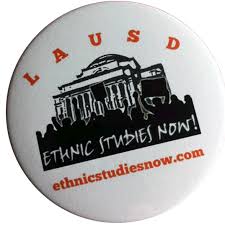Ethnic studies gaining momentum after slow growth in California school districts
.jpg)
An expansion of ethnic studies courses in some of California’s largest school districts is changing the way thousands of students are learning about the historical contributions of a wide range of racial and ethnic groups.
Over the past few years, Los Angeles Unified, the state’s largest school district, and San Francisco Unified, the sixth biggest, have added courses in their high schools designed to broaden understanding of the roles played by African-Americans, Latinos and other racial and ethnic groups.
Last October, the Oakland Unified school board approved an ethnic studies course for all Oakland high schools within three years, and last month the board of San Diego Unified voted for an ethnic studies pilot program in two high schools for the 2016-17 school year. San Diego Unified is the state’s second-largest school district; Oakland ranks 12th.
The new courses — which are adding to whatever is taught about these groups in existing history and social studies courses — have come about in response to critics who say the more traditional courses present an excessively Eurocentric view of American history and culture. Just under 11 percent of L.A. Unified’s 643,000 students are white, with the rest from a variety of other racial and ethnic groups.
This year, about 40 of Los Angeles Unified’s 150 high schools offered six one-semester ethnic studies courses — Afro-American History, Afro-American Literature, American Indian Studies, Asian Literature, Mexican-American Literature and Mexican-American Studies. Plans are now underway to offer a one-semester, survey-style course in ethnic studies to even more high schools, starting in the fall. The specific number of schools has not yet been determined.
Derrick Chau, L.A. Unified’s director of secondary instruction, said the survey course would include separate units on the cultural experiences of African-Americans, Latinos, Asians and Pacific Islanders as well as the lesbian, gay, bisexual and transgender community. “And we’re open to adding more,” he said, citing Armenian studies as one possibility.

The push to expand courses to more schools across Los Angeles comes from a school board resolution passed in November 2014 to make an ethnic studies course a requirement for graduation, beginning with the graduating class of 2019.
But six months after the vote, then-Superintendent Ramon Cortines came out against the plan, objecting to making the course a graduation requirement and citing the cost — an estimated $72 million to cover textbooks and specially-trained teachers. He also expressed a preference for weaving ethnic studies into the regular school curriculum from a child’s first year in public school, as early as pre-kindergarten.
Taking those concerns into account, a committee appointed to examine how to expand ethnic studies continued to meet and last month reported to the board that it was moving toward a solution — but not as the board had originally intended. The new course would be an elective and serve as a compendium to the six individual courses that are now being revised to create a year-long program with all of the courses as electives. None would be required for graduation.
“Right now,” Chau said of the graduation requirement, “we don’t have the time or money to implement it that way.”
San Francisco Unified began offering an ethnic studies elective course as a pilot program in five high schools in 2010. In December 2014, the district school board voted unanimously to expand the program in the current academic year to all of the city’s 18 public high schools. The resolution also “encourages Ethnic studies gaining momentum after slow growth in California school districts | EdSource:

Ethnic Studies Now Coalition http://bit.ly/24vIwvP
